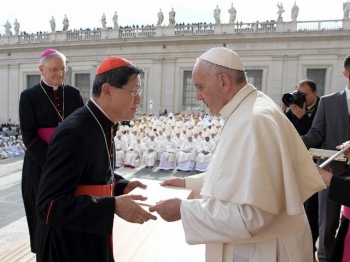Misericordia et Misera: “So that God’s caress may reach everyone”
 Cardinal Luis Antonio Tagle of Manila – member of the Order of the Holy Sepulchre – while receiving the Apostolic Letter Misericordia et misera from the hands of Pope Francis which opens the future to a culture of mercy in all areas of our personal and social life. Copyright: Osservatore Romano
Cardinal Luis Antonio Tagle of Manila – member of the Order of the Holy Sepulchre – while receiving the Apostolic Letter Misericordia et misera from the hands of Pope Francis which opens the future to a culture of mercy in all areas of our personal and social life. Copyright: Osservatore Romano
During the Jubilee of Mercy, more than 21 million pilgrims passed through the Holy Door of St. Peter’s Basilica while, worldwide, more than 800 million believers experienced this spiritual exercise of crossing the Holy Doors open in diocesan churches or in sanctuaries. And this Holy Year was a form of spiritual training, an exercise to welcome mercy and to become its instruments to bring it everywhere, as the Pope explained in his Apostolic letter Misericordia et misera - Mercy with misery - publicly signed on the last day of the Jubilee Year, November 20, the feast of Christ the King, after Mass in the presence of the new cardinals, in St. Peter’s Square. Among the people drawn from all walks of life who symbolically received this document from the hands of Francis, to transmit it to the world, the two chosen bishops are members of the Order: Cardinal Luis Antonio Tagle, archbishop of Manila, and Monsignor Leo Cushley, Archbishop of Edinburgh.
This letter points out “the path that we are called to follow in the future,” remaining faithful to the teachings of Christ. “Mercy cannot become a mere parenthesis in the life of the Church,” explains the Holy Father at the beginning of this letter, which was officially made available on Monday 21 November, the Feast of the Presentation of Mary. “Let us trust in her maternal assistance and follow her perennial counsel to look to Jesus, the radiant face of God’s mercy" so that we can realize once more that “everything is resolved in the merciful love of the Father.”
“Like a gusting but wholesome wind, the Lord’s goodness and mercy have swept through the entire world,” wrote the Holy Father, and as “it has truly been like a new visitation of the Lord among us,” that “we have felt his life-giving breath poured out upon the Church.” The time has come to understand “how best to continue, with joy, fidelity and enthusiasm, experiencing the richness of God’s mercy.”
Poverty, misera in Latin, which is the second important word in the title of the Pope’s letter, is found above all in the fact that “God himself is now a stranger to many” “and this represents the greatest poverty and the major obstacle to the recognition of the inviolable dignity of human life” (Misericordia et Misera 18).” Mercy is thus an urgently needed remedy for a moral and spiritual poverty linked to “the culture of extreme individualism“ in the West which “has led to a loss of a sense of solidarity with and responsibility for others.”
The Holy Father develops the ideas that Mercy must be celebrated, most notably in the sacraments, and that Mercy is lived in the everydayness of our lives, in our encounters with others. With regards the celebration of Mercy, the Pope wishes that the word of God is above all taken more deeply into the Christian community, and he proposes that one Sunday in the liturgical year be entirely devoted to this, on the theme of mercy, something which will hopefully lead to concrete charitable actions and works.
Socially speaking, he indicates that, “We are called to promote a culture of mercy based on the rediscovery of encounter with others”. ”The culture of mercy is shaped in assiduous prayer, in docility to the working of the Holy Spirit, in knowledge of the lives of the saints and in being close to the poor”.
“This is the time of mercy”, repeats Peter’s successor five times at the end of his letter – perhaps a reference to the five wounds of Christ – “since no one can think that he or she is cut off from God’s closeness and the power of his tender love”, for it is through the testimony of believers that “God’s caress may reach everyone”.
(January 26, 2017)



